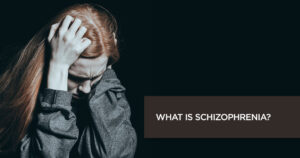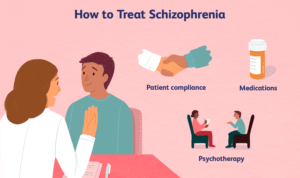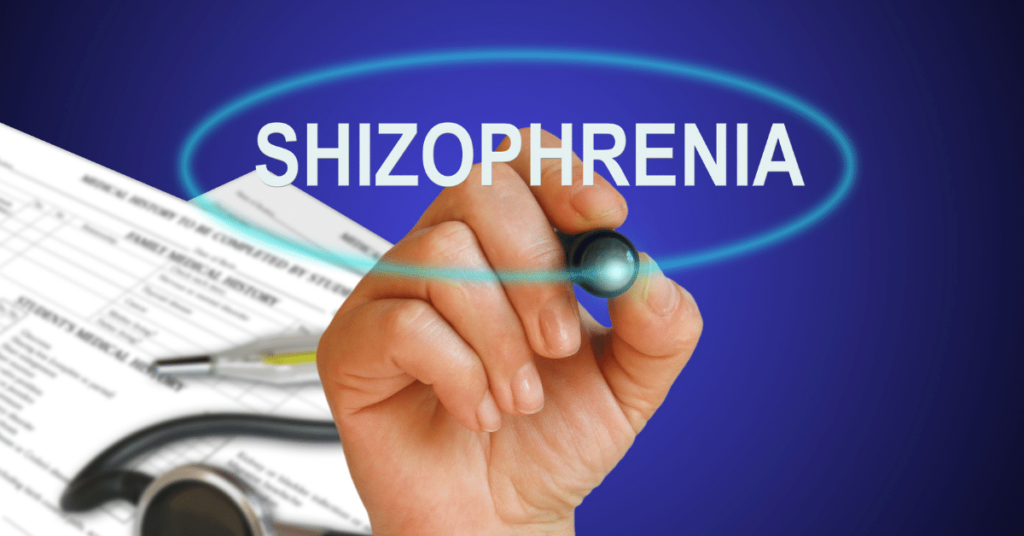Schizophrenia is a mental disorder with symptoms including auditory hallucinations, paranoid or bizarre delusions, or disorganized speech, and thinking. This condition affects around 2% of the population and is more common in men than in women. The three most well-known subtypes of schizophrenia disorder are paranoid schizophrenia, catatonic schizophrenia, and undifferentiated schizophrenia.
Contents
What Is Schizophrenia?

Schizophrenia is a mental disorder that is characterized by a number of different symptoms, including auditory hallucinations, paranoid or bizarre delusions, and disorganized speech and thinking. This condition is estimated to affect around 2% of the population and is more common in men than women. While the cause of schizophrenia is not yet fully understood, it is believed to be a combination of environmental and genetic factors. There are a number of different treatment options available for people with schizophrenia, including medication, therapy, and self-care. There are also a number of ways that people can help to reduce their risk of developing schizophrenia.
Types Of Schizophrenia
There are a number of different types of schizophrenia. These include paranoid schizophrenia, catatonic schizophrenia, and undifferentiated schizophrenia.
Paranoid schizophrenia
 Paranoid schizophrenia is characterized by delusions or auditory hallucinations involving persecution or conspiracy. People with this form of disorder often have an intense distrust of other people, believing that others are trying to exploit, punish, or deceive them. They may be guarded and suspicious and have a hard time forming relationships.
Paranoid schizophrenia is characterized by delusions or auditory hallucinations involving persecution or conspiracy. People with this form of disorder often have an intense distrust of other people, believing that others are trying to exploit, punish, or deceive them. They may be guarded and suspicious and have a hard time forming relationships.
Its Symptoms-
People with paranoid schizophrenia may be emotionally cold and detached. They may have a hard time expressing emotions or understanding the emotional reactions of other people.
Delusions-Paranoid schizophrenia is characterized by delusions involving persecution or conspiracy. People with this form of disorder often have an intense distrust of other people, believing that others are trying to exploit, punish, or deceive them. They may be guarded and suspicious and have a hard time forming relationships.
Types of Treatment
There are a number of different treatment options available for paranoid schizophrenia, including medication, therapy, and self-care. It is important to work closely with your doctor in order to determine what treatment is right for you. Medication can help decrease the most troubling symptoms but cannot cure schizophrenia. Therapy, such as cognitive-behavioral therapy (CBT), can help people with this condition manage their symptoms and improve coping skills. Catatonic schizophrenia
Catatonic Schizophrenia
 People with catatonic schizophrenia often show symptoms such as excitement (agitation), stupor, waxy flexibility (rigidity), excitement (excitement), confusion, and aimless agitation. This form of schizophrenia often results in a decrease in activities and social withdrawal. People with catatonic schizophrenia may also display unusual movements, such as staring off into space for long periods of time or repetitive movements.
People with catatonic schizophrenia often show symptoms such as excitement (agitation), stupor, waxy flexibility (rigidity), excitement (excitement), confusion, and aimless agitation. This form of schizophrenia often results in a decrease in activities and social withdrawal. People with catatonic schizophrenia may also display unusual movements, such as staring off into space for long periods of time or repetitive movements.
The second type of schizophrenia is catatonic schizophrenia. This disorder is characterized by periods where a person does not move or speak. There are two subtypes of catatonic schizophrenia:
Its Symptoms
Catatonic excitement- People with this subtype may seem agitated or overactive. They may be unable to sit still or sleep during periods where they are otherwise motionless or silent for hours.
Catatonic stupor – People with this subtype may appear extremely sleepy or withdrawn. They may be unable to move or speak during periods where they are otherwise in an excited state.
Types of Treatment
There are a number of different treatment options available for catatonic schizophrenia, including medication, therapy, and self-care. It is important to work closely with your doctor in order to determine what treatment is right for you. Medication can help decrease the most troubling symptoms but cannot cure schizophrenia. Therapy, such as CBT, can help people with this condition manage their symptoms and improve coping skills.
Undifferentiated Schizophrenia
 This is the most common type of schizophrenia and is diagnosed when a person does not meet the diagnostic criteria for any of the other subtypes. This type of schizophrenia can be characterized by a number of different symptoms, including delusions, hallucinations, disorganized speech and thinking, and negative symptoms such as social withdrawal or lack of emotion.
This is the most common type of schizophrenia and is diagnosed when a person does not meet the diagnostic criteria for any of the other subtypes. This type of schizophrenia can be characterized by a number of different symptoms, including delusions, hallucinations, disorganized speech and thinking, and negative symptoms such as social withdrawal or lack of emotion.
Its symptoms
Disorganized speech and thinking– People with this subtype may have a hard time forming sentences and speaking in a logical manner. They may abruptly change the subject of conversation or make up words and lose associations between ideas (tangentially).
Lack of emotion– People with this subtype of schizophrenia often have an overall lack of emotions or interest in life. This is sometimes referred to as negative symptoms or deficit symptoms. People with negative symptoms often have trouble holding a job or maintaining relationships, as these things require motivation and energy.
Types of Treatment
There are a number of different treatment options available for undifferentiated schizophrenia, including medication, therapy, and self-care. It is important to work closely with your doctor in order to determine what treatment is right for you. Medication can help decrease the most troubling symptoms but cannot cure schizophrenia. Therapy, such as CBT, can help people with this condition manage their symptoms and improve coping skills.
Disorganized Schizophrenia
 People with disorganized schizophrenia often have trouble organizing their thoughts and activities. They may exhibit disorganized speech, thinking, and behavior. They may also be unaware of what is going on around them and have a hard time relating to others. Another symptom is that they may also show a marked lack of interest or enthusiasm and a decrease in goal-directed activity.
People with disorganized schizophrenia often have trouble organizing their thoughts and activities. They may exhibit disorganized speech, thinking, and behavior. They may also be unaware of what is going on around them and have a hard time relating to others. Another symptom is that they may also show a marked lack of interest or enthusiasm and a decrease in goal-directed activity.
Its Symptoms
People with this subtype often have trouble speaking in a way that is understandable. They may abruptly shift topics or say things that don’t make sense. They also have trouble holding a conversation because they are unable to speak fluently and coherently.
Disorganized behavior- People with disorganized schizophrenia may exhibit odd behaviors, including unpredictable changes in facial expression, sudden outbursts of anger or laughing for no reason, or repetitive actions such as pacing or rocking back and forth.
Types of Treatment-
There are a number of different treatment options available for disorganized schizophrenia, including medication, therapy, and self-care. It is important to work closely with your doctor in order to determine what treatment is right for you. Med
Residual Schizophrenia
 This type of schizophrenia is diagnosed when a person has had a previous episode of schizophrenia but no longer meets the diagnostic criteria for the disorder. People with residual schizophrenia may still experience some symptoms, such as delusions or hallucinations.
This type of schizophrenia is diagnosed when a person has had a previous episode of schizophrenia but no longer meets the diagnostic criteria for the disorder. People with residual schizophrenia may still experience some symptoms, such as delusions or hallucinations.
Its Symptoms
People with residual schizophrenia may still experience some symptoms, such as delusions or hallucinations. However, the symptoms are not as severe as they were during the person’s earlier episode of schizophrenia.
Types of Treatment
There are a number of different treatment options available for residual schizophrenia, including medication, therapy, and self-care. It is important to work closely with your doctor in order to determine what treatment is right for you. Medication can help manage symptoms, but it is not a cure for schizophrenia. Therapy can help people with residual schizophrenia learn how to cope with their symptoms and improve their life skills.
Causes of Schizophrenia
The cause of schizophrenia is not yet fully understood, but it is believed to be a combination of environmental and genetic factors.
Environmental Factors
Many experts believe that environmental factors play a role in the development of schizophrenia. These factors may include exposure to viruses, toxins, or certain stressors during fetal development or early childhood.
Genetic Factors
Schizophrenia is believed to be partly caused by genetics. Studies have shown that people who have a family member with schizophrenia are more likely to develop the disorder themselves. People who have a first-degree relative with schizophrenia, such as a parent or sibling, are also at risk.
The Risks of Schizophrenia in Women vs. Men
While males and females both have about the same 1 in 100 chance of developing schizophrenia over the course of their lives. However, schizophrenia is a condition that more often men acquire than women. This may be due to the fact that some of the symptoms of schizophrenia, such as social withdrawal and lack of emotion, are more common in women.
Treatment Options For Schizophrenia

There are a number of different treatment options available for people with schizophrenia, including medication, therapy, and self-care.
Medication
The most common type of medication used to treat schizophrenia is an antipsychotic medication. These medications help to control the symptoms of schizophrenia by blocking certain chemicals in the brain.
Therapy
Therapy is an important part of treatment for schizophrenia. Cognitive-behavioral therapy (CBT) is one type of therapy that can be effective in helping people with schizophrenia manage their thoughts, feelings, and behaviors. CBT can also help people with schizophrenia learn to monitor their emotions and effectively cope with stress.
Support Groups
Support groups are another type of treatment for schizophrenia. These groups provide a place where people can connect with others who have similar experiences in order to gain support and advice. Support groups may include family members of people with schizophrenia, other individuals with the disorder, or others who want to learn more about the condition.
Self-Care
People with schizophrenia can also benefit from practicing self-care. This includes healthy eating habits and physical activity, as well as finding ways to reduce stress by coping with negative emotions or practicing relaxation techniques.
3 Schizophrenia Spectrum Disorders
Schizophrenia spectrum disorders (SSDs) are a group of mental disorders that share some similar features, such as problems with thinking, feeling, and behaving. These disorders include schizophrenia, schizoaffective disorder, delusional disorder, and paranoid disorder.
While the symptoms of each SSD may vary from person to person, they generally include problems with thinking, feeling, and behaving. People with SSDs may have delusions (false beliefs) or hallucinations (sensations that are not actually happening). They may also experience problems with emotion, such as feeling sad or angry for no reason or having trouble relating to others.
People with SSDs may also have difficulty functioning in everyday life. They may have trouble holding a job or taking care of themselves and may have difficulty maintaining relationships.
These disorders are-
Schizoaffective Disorder- Schizoaffective disorder is a mental illness that combines features of schizophrenia and bipolar disorder. People with schizoaffective disorder may experience symptoms of both disorders, such as delusions and hallucinations, as well as problems with mood and thinking.
Schizophreniform disorder- Schizophreniform disorder is a mental illness that is similar to schizophrenia but lasts for a shorter period of time. The schizophreniform disorder may last for up to six months, after which it slowly develops into schizophrenia.
Schizotypal personality disorder- Schizotypal personality disorder is a mental illness that shows symptoms like having eccentric thoughts and behavior. People with a schizotypal personality disorder may have odd beliefs or think that they can read people’s minds. They may also have trouble interacting with others and maybe socially isolated.
Conclusion
The most common subtypes of schizophrenia are paranoid, catatonic, and disorganized. This blog post has provided you with information on each of these three types and how they differ from one another. If you want to learn more about the disease or research treatment options for yourself or a loved one, we recommend checking out some additional resources linked at the bottom of this article. We hope that by reading this post, those with any subtypes of schizophrenia will feel less alone as well as learn new strategies to cope with their condition.
If you are looking for affordable Online Counseling MantraCare can help: Book a trial therapy session


